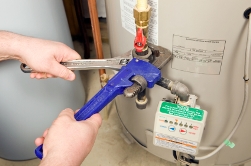Things to Ask Plumber Tech Schools

Once you have decided to earn a certificate, diploma or degree, you can begin to refine your training options. Considering that there are numerous plumbing trade and vocational schools in the Reading MA area, it's essential to have a checklist of criteria that each school must satisfy. The initial 2 that we talked about were location and the cost of tuition. And while both qualifiers may be critical when making your selection, there are additional variables that must be taken into account also. Below is a checklist of those additional qualifications that you will need to assess prior to selecting a plumber trade school.
Is the Plumbing School Accredited? Many plumbing trade schools have acquired either a regional or a national accreditation. They can receive Institutional Accreditation, which involves the school's programs overall, or Programmatic Accreditation, which relates to a specific program, for instance electrical technology. Confirm that the Reading MA program and school are accredited by a U.S. Department of Education acknowledged accrediting agency, which includes the Accreditation Board for Engineering and Technology. Along with helping make certain that you get an excellent education, it may assist in securing financial aid or student loans, which are frequently unavailable for non-accredited schools. Additionally, many states require that the plumbing training course be accredited in order to be approved for licensing or certification.
Is the Plumbing School Licensed? In addition to accreditation, another way of determining if a trade school you’re considering is reputable is by making sure that it’s properly licensed. Licensing is typically controlled and regulated by state agencies, such as the Massachusetts Department of Education. If you don’t know, ask the school which state agency is responsible for its licensing and then verify that it’s up to date.
How Long has the School been in Business? Another means of determining the quality of a technical school is to find out how long it’s been in business. The longer a school has been in operation, the more likely that its programs are highly rated and regarded. Conversely, schools that are not well regarded or that provide low quality training generally don’t stand the test of time. However, keep in mind that even the best of Reading MA schools had to start from their first day of operation, so only use it as one of several qualifications for each school you are considering.
What are the School’s Completion and Placement Rates? Ask the plumbing training programs you are reviewing what their completion rates are. The completion rate is the percentage of students who enroll in and finish the course. A low completion rate may signify that students were dissatisfied with the program and dropped out. It could also signify that the instructors were not competent to instruct the students. It's also essential that the schools have high job placement rates. Older and/or more reputable schools may have a more extensive directory of alumni, which can produce more contacts for the school to use for their apprenticeship and job placement programs. A high job placement rate can not only validate that the school has an excellent reputation within the trade, but also that it has the network of contacts to assist graduates obtain apprenticeships or jobs in the Reading MA area.
Are Apprenticeship Programs Sponsored? Most plumber training programs are taught together with an apprenticeship or an internship program. Those participating vocational and trade schools will help place you in an apprenticeship program inside their network of plumbing companies or trade unions. Ask if the schools you are comparing have working partnerships with local Reading MA plumbers or plumbing companies. An apprenticeship not only provides a rewarding experience by furnishing hands-on training, but it also furnishes employment opportunities and helps to establish relationships in the local plumbing professional community.
Are there Modern Facilities? Make certain that the school facilities and the equipment that you will be trained on are state-of-the-art and what you will be using in the field. If you are presently in an internship or an apprenticeship, consult with the master plumber you are working under concerning what you should be looking for. If not, ask a local Reading MA plumbing contractor if they can give you some tips.
Where is the School Located? Unless you are willing to relocate, the school must be within driving distance of your Reading MA home. Remember that if you decide to attend an out-of-state school, besides the added relocation costs there may be higher tuition fees compared to in-state residents.
Are there Smaller Classes? It's important that you get as much individualized training as possible, which can be difficult in larger classes. Ask if you can sit in on a couple of the classes so that you can see how large they are and witness first hand the interaction between students and instructors. Talk to a few of the students and get their comments regarding class sizes and instruction. Last, speak with some of the instructors and find out what their level of experience is in Reading MA and what degrees or certifications they have earned.
Is the Class Schedule Convenient? Confirm that the class schedules for the schools you are evaluating are flexible enough to fulfill your needs. If you can only attend classes in the evening or on weekends near Reading MA, confirm that the schools you are looking at provide those choices. If you can only attend part-time, be sure that the school you select offers part-time enrollment. Additionally, find out what the protocol is to make-up classes should you miss any due to work, sickness or family responsibilities.
